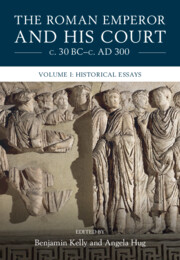Book contents
- The Roman Emperor and His Court c. 30 BC–c. AD 300
- The Roman Emperor and His Court c. 30 BC–c. AD 300
- Copyright page
- Dedication
- Contents
- Figures
- Tables
- Contributors
- Preface and Acknowledgements
- Abbreviations and Conventions
- 1 Introduction
- 2 Hellenistic Influences on Roman Court Culture
- 3 Republican Precursors
- 4 The Imperial Family
- 5 The Roman Aristocracy at Court
- 6 Administration, Finances, and the Court
- 7 Foreign Royals at the Imperial Court
- 8 Domestic Servants in the Imperial Court
- 9 The Imperial Palaces on the Palatine Hill: Architecture as a Reflection of Social Practices and Imperial Authority
- 10 Imperial Villas
- 11 Imperial Journeys
- 12 The Court and Ceremonial
- 13 Dining and Hunting as Courtly Activities in the Roman Empire
- 14 Sexuality and the Court
- 15 Violence and Security at Court
- 16 Religion and Divination at Court
- 17 Performance and Performers at Court
- 18 Literary Patronage and the Roman Imperial Court from Augustus to the Severan Dynasty
- 19 Dress, Adornment, and Self-Presentation
- 20 Epilogue: Continuity and Change at the Roman Imperial Court
- Bibliography
- Index of Personal Names
- General Index
1 - Introduction
Published online by Cambridge University Press: 29 September 2022
- The Roman Emperor and His Court c. 30 BC–c. AD 300
- The Roman Emperor and His Court c. 30 BC–c. AD 300
- Copyright page
- Dedication
- Contents
- Figures
- Tables
- Contributors
- Preface and Acknowledgements
- Abbreviations and Conventions
- 1 Introduction
- 2 Hellenistic Influences on Roman Court Culture
- 3 Republican Precursors
- 4 The Imperial Family
- 5 The Roman Aristocracy at Court
- 6 Administration, Finances, and the Court
- 7 Foreign Royals at the Imperial Court
- 8 Domestic Servants in the Imperial Court
- 9 The Imperial Palaces on the Palatine Hill: Architecture as a Reflection of Social Practices and Imperial Authority
- 10 Imperial Villas
- 11 Imperial Journeys
- 12 The Court and Ceremonial
- 13 Dining and Hunting as Courtly Activities in the Roman Empire
- 14 Sexuality and the Court
- 15 Violence and Security at Court
- 16 Religion and Divination at Court
- 17 Performance and Performers at Court
- 18 Literary Patronage and the Roman Imperial Court from Augustus to the Severan Dynasty
- 19 Dress, Adornment, and Self-Presentation
- 20 Epilogue: Continuity and Change at the Roman Imperial Court
- Bibliography
- Index of Personal Names
- General Index
Summary
This introduction begins by surveying earlier scholarship on the Roman imperial court, arguing that the landmark works have been unduly confined to the court in the city of Rome, to particular time periods, and to certain narrowly defined themes. It then discusses the definition of ‘court’, presenting the social definition used in the book, namely a circle of people in reasonably regular personal contact with the emperor. The introduction also considers what kinds of historical knowledge in relation to the Roman court are possible. The sources lack the focus and detail needed for a narrative history of the court; nor can we convincingly posit a model that encapsulates the impact and operation of the court over c. 300 years. Instead, one should identify features of court life and culture that recur, even if they did not exist (or are not evidenced) under every emperor.
- Type
- Chapter
- Information
- The Roman Emperor and his Court c. 30 BC–c. AD 300 , pp. 1 - 15Publisher: Cambridge University PressPrint publication year: 2022
- 1
- Cited by

